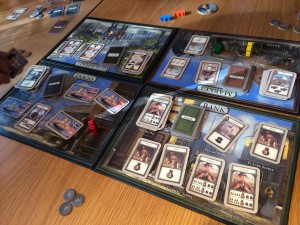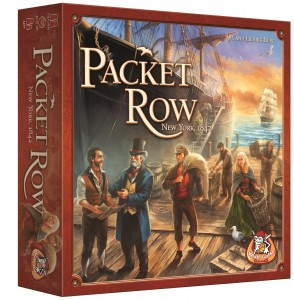Review: Packet Row
Posted by James (admin) on April 17th, 2014
 One of my favourite board games ever is Oregon (which was the game the designers of Rattus made before Rattus). So, after many Rattus expansions, I was very excited when the Bergs announced a new, original game called Packet Row with a very interesting game mechanic.
One of my favourite board games ever is Oregon (which was the game the designers of Rattus made before Rattus). So, after many Rattus expansions, I was very excited when the Bergs announced a new, original game called Packet Row with a very interesting game mechanic.
The game is set in New York in 1842 and players are trading companies. The game board is comprised of 4 boards (Docks, Bank, Market and Guildhall) where the cards for each board are displayed. The primary method of earning money is by completing contracts (Guildhall cards) which can be fulfilled by having the goods (Market cards) and ship (Dock cards) shown on the contract. Money can also be gained from the bank (Bank cards), plus various other cards in all areas have some special effects too including some being worth victory points (VPs). At the end of the game, players add up their VPs from cards that show VPs, cash (divided by 10), and banker cards (if they have the most cash) – most VPs wins. This means cash is vital because most cards cost money, and cards can earn you more money, VPs and special abilities.
Gameplay is simple and fast as each player may gain up to 1 card during a round. So far this is all straight forwards but it is how the cards are gained that is the interesting heart of Packet Row. Each round, one player is the lead player (the harbour master) and they select one of the 4 boards. All players then take turns choosing to either take one of the cards from this board or pass. The harbour master is the last player to choose – if the harbor master takes a card then the round ends and any player(s) who passed get nothing. If the harbour master doesn’t take a card, then the harbour master chooses another board and all players who have not yet taken a card this round have the same choice again – take a card from this board or pass.
This simple game mechanic delivers a very interesting psychological element to the game. Should I take a card now in case the harbour master takes one and I would get nothing? Or, do I risk not taking a card because I hope/think the harbour master will select another board where there is a card I want more (although someone may take it before me)? Turn order is important as being earlier in turn order means you get first choice of cards on a board, and this constantly changes as harbour master passes clockwise each round.
The harbour master has a very interesting decision to make too. You get last pick of cards in each area so you don’t want to pick an area where there’s a card you really need if you think other players will take it before you can. As a result, you may want to hide your intentions by picking different areas first to try and tempt other players into taking cards so you have less competition. Then again, you don’t want to let other players get cards they really want either or you’re helping them. So, there’re lots of interesting bluffs and tactics to the game, and you’re always reassessing the situation depending on who picked cards and who didn’t. For example, you may select a board thinking you won’t take a card from it but, if all other players pass, you may change your mind and take a card so everyone else get nothing – which is nothing if not humourous.

Packet Row plays very quickly and doesn’t last too long. It ends when a number of the boards can not be refilled fully and you need to watch this carefully or have unused cards in your hand with no benefit. The game caters for different numbers of players by having different amounts of cards on each board (usually the number of players minus 1).
I like how each board not only shows the cards that are available this round, but also shows the next 2 cards that will be the next to be added to that board. This gives players some insight into what’s coming next rather than work completely in the dark.
There is some luck in what cards are available. Sometimes, due to the timing of the card draw, you may have the opportunity but not the money to get a card you really need, or vice versa. Sometimes, multiple cards you want/need appear in the same round but you only get 1 and the others get discarded. So, there is a luck of the draw element in Packet Row but it is acceptable in a short, fast game and adapting to uncertain availability is part of the game – also, I have felt any poor performance has been due to my decisions and risks more than misfortune. It’s an advantage (but not essential) if you can remember if lots of the cards you want have already been discarded/taken.
At the end of each round, if any cards are taken from a board then all the remaining current cards on that board are removed and new ones drawn. This allows players to purposefully trigger the removal of the cards whether because they want a new set of cards for next round, want to get rid of cards another player may want, or speed the end of the game. With many cards being removed and dealt from one or more boards each round, there’s quite a lot of upkeep to do especially as, whilst quick, the short rounds means it happens a lot. I found it best to allocate upkeep of a board to each player so that the upkeep is spread out and occurs simultaneously; as a result, the upkeep is quick and not a problem – just a bit fiddly.
The only aspect of the game that I found isn’t so good is that the cards are extra glossy. Normally this would not be an issue but the gloss means they slide around a lot (especially against each other) making the upkeep more fiddly and making the boards and piles messy. Each board has lots of areas for cards (up to 4 areas for the current cards, 2 for future areas, a draw pile area and a discard pile area), so it’s hard for these not to quickly become unruly.
I have yet to play with 2 players and am intrigued what that would be like. I have a suspicion the game is better with more players when there is more competition for cards, and a wider variety of players choosing which areas to pick from. I think it would still be good with two (and I’ve read reports of people enjoying it with 2 players), but I expect more players will be my preference.
I really like Packet Row – it’s a light game that delivers a very interesting and clever psychological game mechanic. There’s a feeling of tension, decision-making and fun (plus the usual humourous satisfaction when a player lets out that sigh when they don’t get the card they wanted). It’s a game that will work well with light or experienced gamers. You can find out more on White Goblin Games’ website: bga.me/packetrow
James.
[Played with 4 and 5 players]

